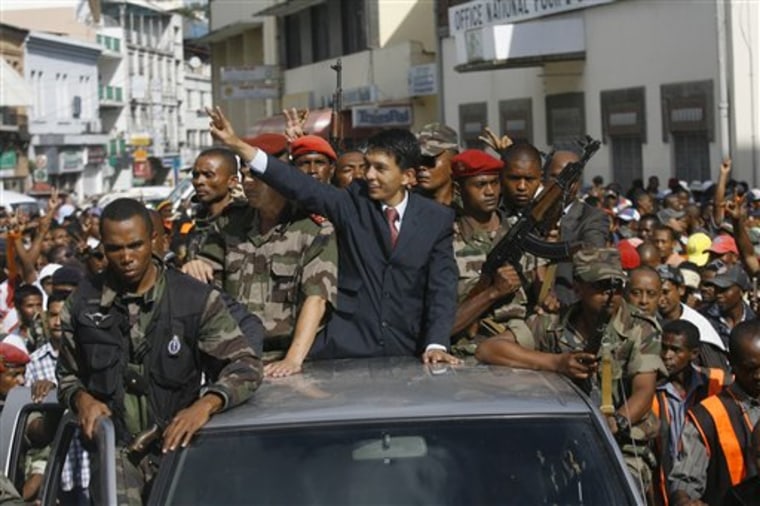Madagascar's top generals handed over control of this Indian Ocean island nation to the toppled president's rival on Tuesday, hours after the president stepped down and tried to put the military in charge.
In a ceremony broadcast from a military camp in the capital, Vice-Admiral Hyppolite Rarison Ramaroson said he and two other generals rejected a move earlier Tuesday by the ousted president, Marc Ravalomanana, to transfer power to a military directorate.
Instead, Ramaroson said the military was installing opposition leader Andry Rajoelina as the country's leader.
For months, Rajoelina — a disc jockey turned broadcasting magnate who had been mayor of the capital — has been pressing Ravalomanana to step down as president. His confrontation with Ravalomanana had led to deadly clashes.
After weeks of insisting he would never resign, Ravalomanana announced Tuesday afternoon he was ceding control to the military. Almost as he spoke, Rajoelina was parading triumphantly through the capital surrounded by armed soldiers and an adoring crowd after seizing control of one of the city's presidential palaces.
Rajoelina had said in an interview with the French television station LCI that he had the support of "soldiers, government workers, unions, that is to say all the country's key groups."
"Power belongs to the people," Rajoelina said. "The people give power, the people can take it back."
Norbert Lala Ratsirahonana, a former chief of staff and former chief of the constitutional court, acted as master of ceremonies for the military announcement, lending the move legitimacy.
Out of touch
Rajoelina — at 34 too young to be president, according to the constitution — accuses Ravalomanana of misspending public funds and undermining democracy in Madagascar. This impoverished island off the coast of southeastern Africa is known both for its natural beauty and its history of political infighting and instability.
Over the weekend, Rajoelina declared himself president of a transitional government and promised new presidential elections within two years. On Monday, he called on the army to arrest the president, but soldiers refused.
Ravalomanana had said Rajoelina sought power by unconstitutional means. A breakaway army faction had claimed it was neutral and interested only in restoring order, but the split in the military had greatly weakened Ravalomanana.
Ravalomanana's rags-to-riches tale — he started out selling ice cream from a bicycle — was once a source of popularity. But Rajoelina, tapping into the dissatisfaction of this country's impoverished majority, was able to portray Ravalomanana as interested primarily in further enriching himself and increasingly out of touch with the suffering of ordinary people.
Rajoelina, though, comes from the wealthy minority that has had a stranglehold on Madagascar's politics.
Early Tuesday, Rajoelina entered one of the capital's presidential palaces, welcomed by soldiers who had declared they would no longer accept orders from Ravalomanana, as well as by traditional healers who specialize in exorcism — the palace had been the site of a deadly clash between anti-government protesters and troops last month.
The soldiers had seized the deserted palace, usually used for ceremonial purposes, on Monday night. The president was in his official residence, surrounded by supporters and army guards.
'Gravely concerned'
Tensions have been rising since late January, when the government blocked an opposition radio station's signal. Rajoelina supporters set fire to a building in the government broadcasting complex as well as an oil depot, a shopping mall and a private TV station linked to Ravalomanana. Scores of people were killed.
Days later, soldiers opened fire on anti-government protesters, killing at least 25. The incident — at the palace seized Monday — cost Ravalomanana much of the support of the military, which blamed him for the order to fire at demonstrators.
Despite losing support at home, Ravalomanana had been backed by the international community because he was the democratically elected president, and because Rajoelina's tactics were seen as unconstitutional.
U.N. Secretary-General Ban Ki-moon is "gravely concerned about the evolving developments in Madagascar," U.N. associate spokeswoman Marie Okabe had said earlier Tuesday at headquarters in New York.
African Union Commission Chairman Jean Ping told journalists earlier Tuesday that if the military leadership handed power to Rajoelina, as it later did, that would violate the constitution. According to the AU's charter, coups or unconstitutional changes of government are cause for automatic suspension from the bloc. The country is only readmitted when constitutional order is restored, usually by elections.
Madagascar is scheduled to host this year's AU summit in June or July, but could not do so if it were suspended from the continentwide body.
Ravalomanana had warned the country could lose international support in aid if Rajoelina were allowed to take over.
More on:
